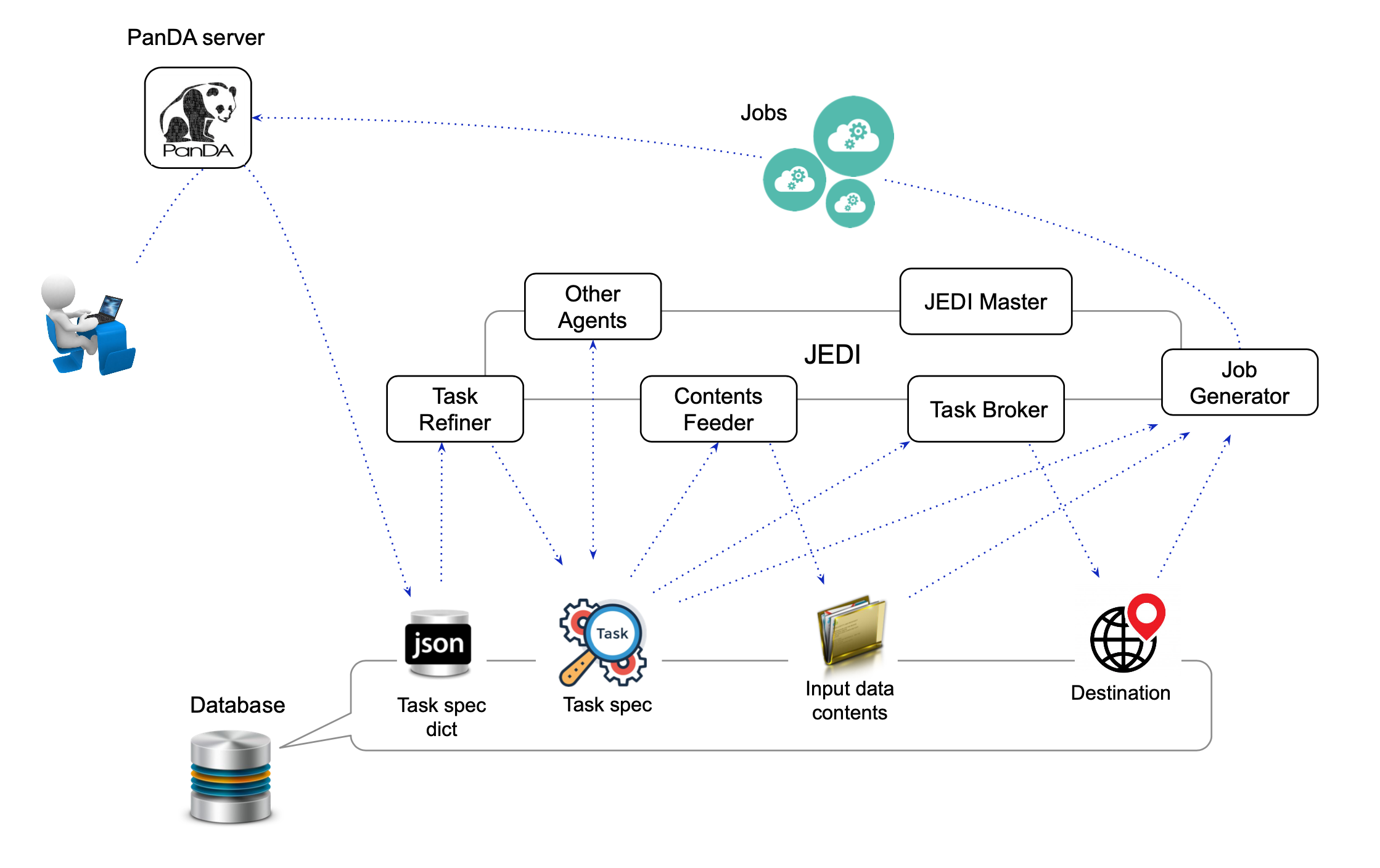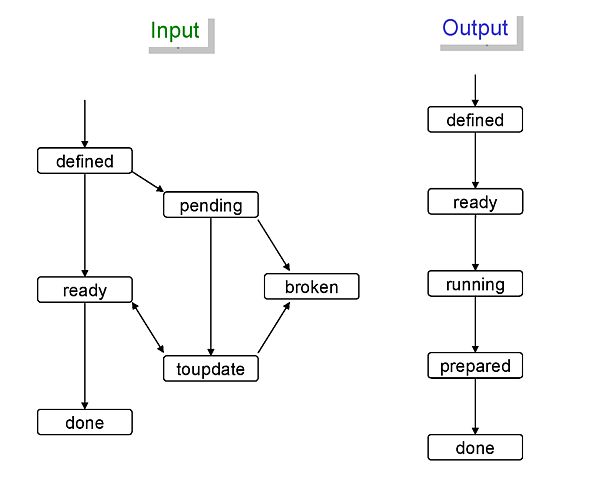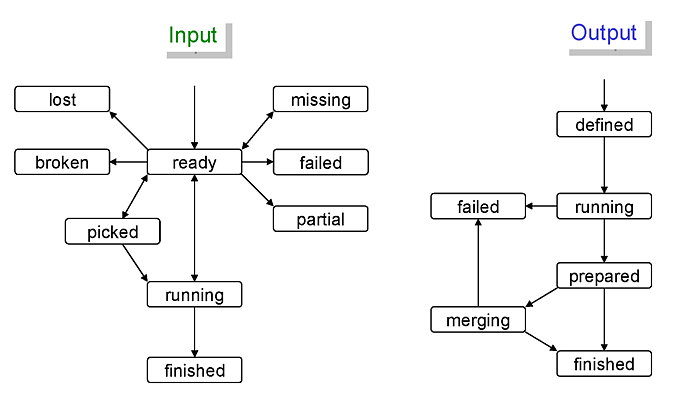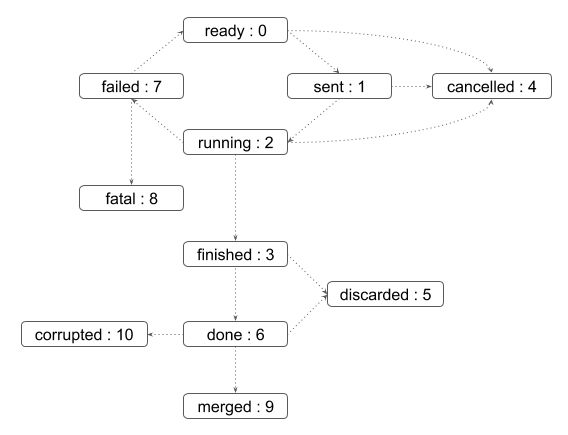JEDI
JEDI (Job Execution and Definition Interface) is a high-level engine to tailor workload for optimal usage of heterogeneous resources dynamically. It processes tasks and generates jobs for PanDA server. The main functions are as follows:
To receive and parse task specifications, which clients submit through the RESTful interface of the PanDA server.
To collect information about task input data.
To decide the destination for each task output data.
To choose the computing resources based on the characteristics and requirements of each task.
To generate and assign jobs to computing resources by taking global shares into account.
To reassign jobs if workload distribution becomes unbalanced among computing resources.
To take actions on tasks according to various timeout configurations or user commands.
To finalize tasks once their input data are done.
JEDI is composed of a master process, stateless agents running on multiple threads/processes, and a fine-grained exclusive lock mechanism. Those agents run independently and don’t directly communicate with each other. They take objects from the database, take actions on those objects, and update the database. Each agent is designed around a plugin structure with the core and experiment/activity-specific plugins.
The exclusive lock mechanism allows operations to be distributed across threads, processes and machines, so that JEDI horizontally scales with multiple machines. For example, while one agent process is working on a particular task, the task is locked and other agent processes are prevented from updating the task. This is typically useful to avoid inconsistent modifications caused by concurrently running processes.

The figure above shows the architecture of JEDI. The details of the master process, agents, their functions, and essential internal objects are explained in the following sections.
JEDI Master
JEDI Master is the main process of JEDI to launch other agents according to modConfig and
procConfig specified in the configuration file.
There is only one JEDI Master process on each machine, and all agents independently run as child
processes of the JEDI Master.
There are two connection pools in JEDI Master, one for connections to the database backend
and another for connections to the data management system. Agents share connections in those pools.
The number of connections to the database or data management system is limited
even if their accesses are quite busy so that those external services are protected.
When JEDI Master gets started, it
initializes connection pools first
launches agents
provides access to the connection pools to the agents
waits an eventual SIGTERM or SIGKILL signal when JEDI is stopped
kills all agents and itself
Agents
Task Refiner
Clients specify tasks in json dictionaries and feed them into the database through the RESTful
interface of the PanDA server.
Task Refiner parses them to instantiate JediTaskSpec objects.
Each JediTaskSpec object represents a task.
The core code defines common attributes of JediTaskSpec, while plugins set experiment/activity specific attributes.
One of the crucial attributes is splitRule concatenating two-letter codes to specify
various characteristics and requirements of the task.
JediTaskSpec objects are inserted into the database once they are successfully instantiated.
Contents Feeder
The Contents Feeder retrieves the contents of input data, such as a list of data filenames,
from the external data management service and records them to the database for subsequent processing
by other agents. If the input data is not a collection of data files, e.g. a list of random seeds,
Contents Feeder records a list of pseudo files in the database.
Task Broker
When tasks specify to aggregate their output, but the final destination is undefined, then the Task Broker
will decide the final destinations of the task output. It is skipped otherwise. The final destination
is chosen for each site by considering its input data locality, free disk spaces and downtime of storage resources,
transfer backlog over the network, and requirements on data processing.
Job Generator
The Job Generator is the busiest agent in JEDI. It chooses the computing resources for each task,
generates jobs, and submits them to the PanDA server.
Job Generator is composed of Job Throttler, Job Broker, Job Splitter, Task Setupper, and
the job submission code. It is highly parallelized since the performance of Job Generator
directly affects the throughput of the whole system. It must scale well since, for example, a single task
can generate millions of jobs.
The entire task pool is first partitioned by global share and resource requirements such as
the number of cores and memory size. Each Job Generator agent takes one partition
in a single processing cycle.
Job Throttler runs in the agent and checks whether there are enough jobs running or queued on computing resources
for the partition.
If not, the agent spawns multiple threads. The Job Broker running on each thread
takes one task in the partition based on its priority and selects appropriate computing resources.
The selection algorithm takes into consideration multiple factors such as
data locality
requirements for data processing and transfers
constraints and downtime of computing resources
and transfer backlog over the network
If one or more computing resources are available, Job Broker passes the task to Job Splitter
which generates jobs to respect task requirements and various constraints of computing resources.
Finally, the job submission code submits those jobs to the PanDA server after Task Setupper prepares
output data collections.
Then Job Broker takes the next task.
Once enough tasks are processed in the partition, the threads are terminated and the
Job Generator agent takes another partition.
Post Processor
Once tasks process all their input data, they are passed to the Post Processor to be finalized.
The post-processing step includes various procedures like validation, cleanup, duplication removal of output data,
dispatch of email notifications to task owners, trigger processing of child tasks, etc.
Watch Dog
Watch Dog periodically takes actions throughout the task lifetime.
Task Commando
Users send the following commands to JEDI through the RESTful interface of the PanDA server.
Task Commando takes actions based on those commands.
- kill
To kill a task. All running jobs of the task are killed.
- finish
To finish a task. There are two modes of this command. The soft finish command disables to generate new jobs for the task and waits until all running jobs are done, while the hard finish command kills all jobs and finishes the task immediately.
- retry
To retry a task. The task will process only input data that were unsuccessful in the previous attempt. Hopeless tasks such as broken and failed tasks reject the retry command since there is no reason to retry.
- incexec
To retry a task with new task parameters after looking up the input data. This is typically useful when new data are appended to the input data and require changes in some task parameters.
- pause
To pause processing of a task. This command disables generating new jobs for the task and pauses queued jobs.
- resume
To resume a paused task. This command enables to generate new jobs for the task and releases paused jobs.
- avalanche
To skip the scouting state for a task. This command changes the task status to running and triggers generation of remaining jobs for the task.
Message Processor
Message Processor consumes messages sent from various external components through ActiveMQ.
Using Message Processor describes it in detail.
Internal objects
Task
JediTaskSpec represents a task. The status transition chart and explanations of task statuses are
available in the Task section.
Dataset
JediDatasetSpec represents a data collection, which is called a dataset.
The status transition charts of input and output datasets are shown below.

Each dataset status is described as follows:
Input dataset
- defined
the dataset information is inserted into the database.
- toupdate
the dataset information needs to be updated.
- pending
the dataset is temporally unavailable.
- broken
the dataset is permanently unavailable.
- ready
the dataset is ready to be used.
- done
all files in the dataset were processed.
Output dataset
- defined
the dataset information is inserted into the database.
- ready
the dataset is ready for the main processing.
- running
files are being added to the dataset,
- prepared
the dataset is ready for post-processing.
- done
the final status.
There are six types of datasets; input, output, log, lib, tmpl_output, and tmpl_log. Log datasets contain log files produced by jobs. Lib datasets contain auxiliary input files for jobs such as sandbox files that are not data. Tmpl_output and tmpl_log datasets are pseudo template datasets to instantiate intermediate datasets where premerged output data files and log files are added to get merged later. Those pseudo datasets are used only when tasks are specified to use the internal merge capability.
File
JediFileSpec represents a file. A dataset is internally represented as a collection of files.
Generally, files are physical data files, but if tasks take other entities as input,
such as collections of random seeds, they are also represented as ‘pseudo’ files.
Files can be retied until they are successfully processed.
JEDI makes a new replica of the file object for each attempt and passes it to the PanDA
server, i.e., file objects in JEDI are master copies of file objects in the PanDA server,
The status transition charts of input and output files are shown below.

Each file status is described as follows:
Input file
- ready
the file information is correctly retrieved from DDM and is inserted into the JEDI_Dataset_Contents table
- missing
the file is missing in the cloud/site where the corresponding task is assigned
- lost
the file was available in the previous lookup but is now unavailable
- broken
the file is corrupted
- picked
the file is picked up to generate jobs
- running
one or more jobs are using the file
- finished
the file was successfully used
- failed
the file was tried multiple times but not succeeded
- partial
the file was split at the event-level, and some of the event chunks were successfully finished
Output file
- defined
the file information is inserted into the JEDI_Dataset_Contents table
- running
the file is being produced
- prepared
the file is produced
- merging
the file is being merged
- finished
the file was successfully processed
- failed
the file was not produced or failed to be merged
Event
JEDI has the capability to keep track of processing at the sub-file level.
A file is internally represented as a collection of events.
JediEventSpec represents an event that is the finest processing granularity.
The status transition chart of the event and each event status are shown below.

- ready
ready to be processed
- sent
sent to the pilot
- running
being processed on a worker node
- finished
successfully processed, and the corresponding job is still running
- cancelled
the job was killed before the even range was successfully processed
- discarded
the job was killed in the merging state after the event range had finished
- done
successfully processed and waiting to be merged. The corresponding job went to final job status.
- failed
failed to be processed
- fatal
failed with a fatal error or attempt number reached the max
- merged
the related ES merge job successfully finished
- corrupted
the event is flagged as corrupted to be re-processed since the corresponding zip file is problematic